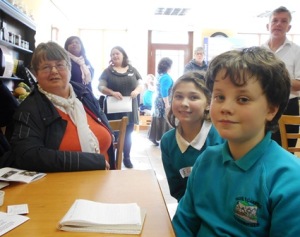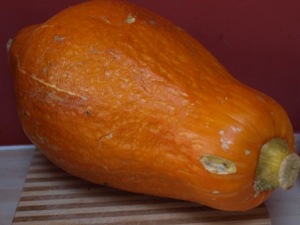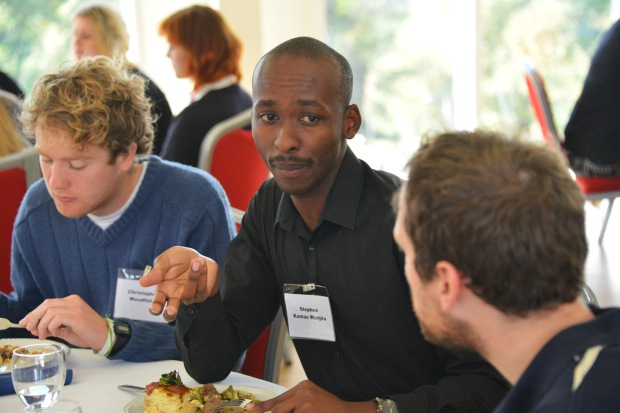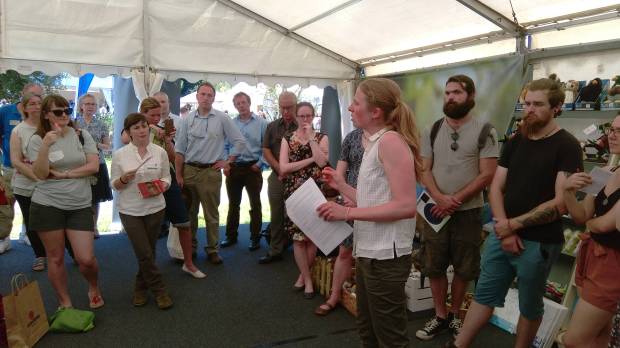
Dr Sophie Wynne-Jones of Bangor University, at the Royal Welsh Show
We’ve just finished another round of Food Values, this time supported by Bangor University under the ESRC Impact Acceleration Account. This time we wanted to explore how food values play out in different settings, and to see how a focus on values can stimulate new approaches to the food system. We ran four events in the spring and summer: a training for Welsh Government civil servants, with an exploration of how food works across departments and the possibilities under the Well-being of Future Generations Act; an event in Aberystwyth to support the distribution of surplus food by supermarkets and community groups; another at the Royal Welsh Show working with the RSPB to find out what farmers care about; and one in Cardiff to look at equalities and social care. You can read about some of these events on the Food Values blog or on Twitter under #foodvalues.
We have also been to other people’s events, and we have had many conversations during the course of the project. From this, some themes have emerged. One is how inspiring it can be to get in touch with our own values. Often we find ourselves working or studying in settings which do not entirely reflect what we care about, for instance being focused on money and achievement, rather than kindness or care for the environment. This mismatch leads to a sense of struggle and uncertainty about what we are supposed to be doing, but once we have seen the contradictions it is possible to work with them more skilfully, and several of the food activists we have worked with have told us how transformative the values approach has been for them. Knowledge is power!
Another is how shared values can help us find common ground across divides of sector or ideology. Farming and wildlife are often pitted against each other, for instance, and yet producing food while maintaining a flourishing ecosystem is in everyone’s interests. Once we get down to the fundamentals of care for the land and care for people, it turns out that there is much that we can agree on, which gives us a better basis for sorting out the details. As we come to terms with Brexit, we need approaches like this which will give us the confidence to face our divisions, knowing that we can find common ground through shared values, if we are able to go deep enough.
A third theme has to do with balance. The values research shows how we tend to seesaw between caring about our own security and wanting the well-being of others. We live in society where we are exposed to constant advertising, shopping opportunities and celebrity culture, and where concerns about the economy and national security dominate public debate, making it hard to talk about compassion, care for the environment and traditional values. Food education has a role in bringing us all around the table, literally, for an experience of our shared humanity. It is a way into culture, health, social justice, care for the environment and global citizenship, counterbalancing the dominant story of the profit motive and individual success.
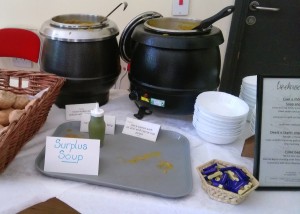
Soup made from surplus food at Aberystwyth
More than that, we can aspire to go beyond the binary view of the seesaw, which is only a limitation of our psychology and not a fact about the real world. It is perfectly possible – though maybe not easy – to be wealthy and powerful and at the same time to be actively working towards human happiness. Businesses have a huge contribution to make in creating a better world, if only we can see them in terms of the work they do rather than the money they make. Similarly, it is possible to value our traditional culture, seeking to understand the contribution of earlier generations, and to be forward-thinking and creative at the same time. We need more stories that will lift us out of our either/or mindset and show us what’s possible.
The Food Values project has not so far engaged much with food in schools, but maybe it’s time to bring this work to the classroom. What values are young people absorbing through the food system as it is now, and how might that change? What would food education look like, if it reflected the full range of human values and intelligence?
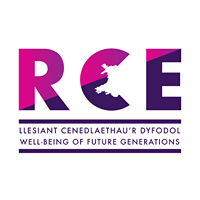 Mae gan yr RCE enw newydd, sef ‘Canolfan Arbenigedd Cymru ar Gynaliadwyedd a Llesiant Cenedlaethau’r Dyfodol’: Mae Einir Young yn esbonio. A dyma hanes byr y grwp bwyd sydd bellach yn dawel ond yn croesawu syniadau newydd. Beth ydych chi’n feddwl?
Mae gan yr RCE enw newydd, sef ‘Canolfan Arbenigedd Cymru ar Gynaliadwyedd a Llesiant Cenedlaethau’r Dyfodol’: Mae Einir Young yn esbonio. A dyma hanes byr y grwp bwyd sydd bellach yn dawel ond yn croesawu syniadau newydd. Beth ydych chi’n feddwl?

